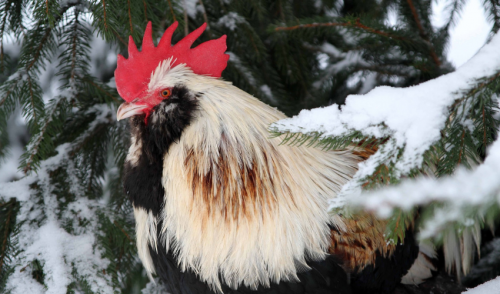{article.name}
Agway, NY -
Hometown Values & Service!
Chatham Agway: 518-392-3241
Claverack Agway: 518-851-5391
Great Barrington Agway: 413-528-2390
Millerton Agway: 518-789-4471
Caring for Backyard Chickens in Winter

- Share this:
- Share on Facebook
- Pin on Pinterest
- Tweet on Twitter
Chickens are becoming more and more widespread in suburban areas, and a backyard flock can be a wonderful part of sustainable living. To keep your chickens healthy, comfortable, and productive in winter, however, it is important to provide them with the proper cold weather care.
Can Your Chickens Care for Themselves in Winter?
Chickens are well-adapted to survive even very cold winter weather. Their feathers provide excellent insulation, and the birds can fluff their feathers to create an even warmer coat. They may even tuck their bills or feet into fluffy feathers to keep those bare parts warm. On sunny days, chickens will position themselves to absorb the sun’s warmth, and on cold nights, they will huddle together in a tight group to share body heat. Chickens can even slightly lower their internal metabolism to better resist cold snaps.
While all chickens can resist the cold somewhat, different chicken breeds have different adaptations and abilities to withstand chilly temperature. Chickens with smaller combs and less bare skin are more cold-adapted, as are breeds with thicker feathering. Australorp, Plymouth Rock, and Cochin chickens are some of the best breeds for cold winters.
Winter Chicken Care
No matter what type of chickens you have, there are many easy ways to give them the appropriate winter care so they are comfortable, healthy, and happy even in the cold.
- Winterize the Coop – Before winter arrives, repair the chicken coop to fix roof leaks and block holes that cause drafts or where predators could enter the coop. Also repair any loose perches or sharp edges that could cause injuries.
- Winterize the Run – In addition to winterizing the chicken coop, be sure the run is safe and ready for winter as well. Fences should be repaired, and you can add a windbreak to offer chickens extra shelter without denying them outside activities.
- Ensure Proper Ventilation – The humidity and fumes from a closed-in coop and decaying feces can cause respiratory problems in chickens. Check that the coop is well-ventilated, with cross-coop airflow that will help clean out the air.
- Deepen Bedding – A thicker layer of wood shavings, coarse sawdust, or straw will help insulate the coop, keep chickens’ feet dry, and be easier to clean. Ideally, provide a bedding layer that is 3-6 inches deep throughout the coop.
- Improve Lighting – If you rely on your chickens to be productive layers, they may need up to 10-14 hours of light per day. Be sure coop windows are not blocked by snow, and consider adding a supplemental light if necessary. Timed lights are an easy, no-fuss option.
- Provide Adequate Space – With all your chickens seeking shelter from the cold, be sure your coop is large enough and has plenty of perches for every bird. If the birds are overcrowded, they could get aggressive and may lose productivity, as well as be at risk from health complications.
- Provide Outdoor Perches – Even on cold days, chickens will want to spend some time outside. Use hay bales, thick branches, log chunks, low benches, or stumps to provide perches outdoors so the birds can get up out of the snow and slush.
- Be Entertaining – A bored chicken can be aggressive and listless. To prevent winter boredom, clean an area so the birds can peck and scratch at the ground, and offer them a cabbage or lettuce head as a hanging treat to peck and play.
- Protect Chickens’ Combs – A chicken’s bare comb is vulnerable to frostbite. Rub a thin layer of petroleum jelly on the comb to moisturize and insulate it during cold snaps. This coating will need to be reapplied regularly throughout the winter.
- Keep Water Liquid – Dehydration can lead to kidney problems and a loss of laying productivity. Use heated bowls to keep plenty of water available to your chickens, and clean the bowls frequently to avoid contamination that could endanger the entire flock.
- Offer a Bedtime Snack – Give your flock a treat of corn later in the evening to help raise their body temperature overnight. Because corn takes a long time to digest, the extra feed will help keep them warm for hours.
One Winter Trick to Avoid
Many people want to protect their backyard chickens from winter’s cold by installing a heat source in the coop, but this can actually be detrimental to the birds. Not only do external heaters increase the risk of fire, but birds can become overheated or burned if they are too close to the heater, even if it is functioning properly. Furthermore, chickens need time to acclimate to colder temperatures, but if their coop is always heated, they won’t develop that natural resilience. This can be especially damaging if the heater fails or if there is a power loss and the birds are suddenly subjected to a severe temperature drop. Only in areas with extreme winters should any external heating be considered, and if it is necessary, it should be done with all the proper safety precautions.
Winter can be a challenging season, but it doesn’t have to be a challenge to care for backyard chickens properly when the temperatures drop. With the right preparation and good care, your flock will thrive and be happy, healthy, and productive all winter long.
© 2026 Millerton Co-op Inc.. All rights reserved.
Serving Millerton, NY - Claverack, NY - Chatham, NY - Great Barrington, MA and the Surrounding Communities.
View our accessibility statement
Driven by New Media Retailer
Agway® is a division of Southern States®



Comments